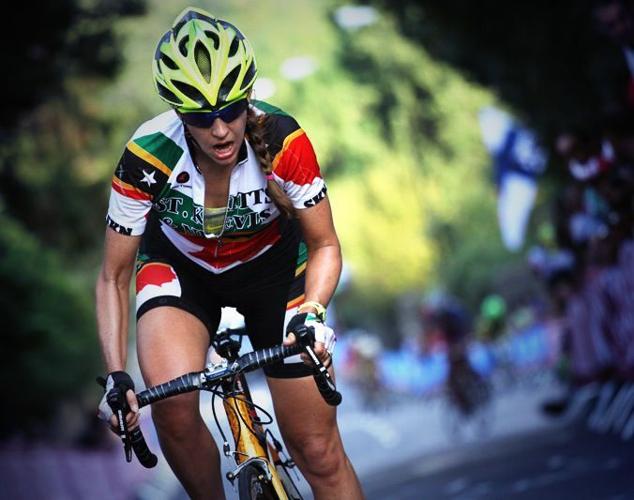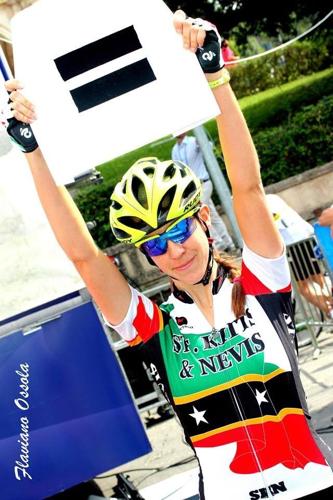Former professional cyclist and activist Kathryn Bertine launched a campaign for a women’s Tour de France from her home in Tucson nine years ago by sending a petition to ASO, the company that organizes the men’s Tour de France.
This year, the dream becomes real.
Le Tour de France Femmes begins Sunday in in Paris. Professional women cyclists will finish their eight-day race on July 31, on top of a mountain called La Super Planche des Belles Filles in northeastern France.
Bertine, along with two other professional cyclists and one professional triathlete, started a petition for a women’s race on Change.org.
“We expected to get about 1,000 signatures from our friends, family, other professional cyclists, amateurs who race,” Bertine explained.
In the end, they sent a petition with over 98,000 signatures because the message of equality resonated with all kinds of people. Bertine quoted one petition signer: “I’m not a cyclist, but the message matters. Women belong anywhere that men have a presence and power. The Tour de France is a perfect example.”
At first, Bertine said, ASO didn’t even acknowledge receipt of the petition. After pressure from international journalists and the public, ASO relented and met with Bertine’s group called Le Tour Entier (the entire Tour).
“We presented ASO with a full 21-day stage race, which was equal to the men’s race. But ASO agreed to do only one day in 2014. Le Tour Entier showed how to add 3-5 days each year to bring the race to parity,” said Bertine.
And they reminded ASO that in the 1980s, Le Tour de France Féminin ran on many of the same days as the men’s race, with slightly shorter stages. Fans cheered along the route for competitors in both races. In fact, American Marianne Martin won the 18-day race in 1984.
ASO and Le Tour Entier created “La Course by Tour de France,” a one-day race in Paris in 2014. And ASO kept it one day for the next seven years.
“It didn’t change because ASO was lazy, apathetic and sexist,” said Bertine.
In 2014, more than 120 networks in 54 countries showed La Course, demonstrating worldwide interest in women’s cycling. Bertine raced in the 2014 event and remembered: “Crowds were huge. Crowds were rows deep on the Champs-Élysées in Paris.”
“We had data showing fans and sponsors saying they want more, the racers want more, the teams want more. It was just tokenism to keep as one day for so long,” she continued. “Tokenism is not equality.”
While waiting for a multiday women’s tour, Bertine took matters into her own hands to support professional women cyclists. She set up the Homestretch Foundation, with the equals sign as its symbol. Athletes apply to spend weeks or months at the Homestretch Foundation house in Tucson, with housing and utilities paid for by the foundation.
Bertine says about the athletes, “They’re happy to have the time and space to pursue their own individual training plans and work toward their goals.”
As part of the agreement, athletes promise to help each other in the house and volunteer two hours per week in the community. Last winter, for example, they volunteered at Cyclovia and at Felicia’s Farm, a farm that donates all of its produce to people who are homeless or in need.
Tucson and Pima County roads offer a variety of cycling, from long flat desert roads and hills to climbing up to Mount Lemmon.
“And they love riding on The Loop on their slower recovery days,” said Bertine.
Since 2016, the Homestretch Foundation has housed 80 athletes — nicknamed “Stretchies” — from 17 countries. Four former “Stretchies” will be on the starting line for Le Tour de France Femmes: Emily Newsom, Leah Kirchmann, Gabby Traxler and Brodie Champman.
Le Tour de France Femmes didn’t happen because of a simple petition, and many details of the fight seem unbelievable in the 21st century. Bertine explores her advocacy and private struggles as a professional cyclist in “Stand,” a memoir-turned-manual on activism. Her story takes the reader behind the scenes, shows the power of people working together to bring change and will inspire anyone who reads it.
Bertine, who is still an avid cyclist, often rides on The Loop with friend Ava Fouts, an 11-year-old cyclist. They met while riding up a challenging hill in Saguaro National Park East a few years ago.
“I passed her and said something like ‘Way to go,’ then Ava jumped into my draft and yelled, ‘You’re not going to pass me that fast lady!’” said Bertine.
“I chatted with her and her father later, and now we ride together about once a week.”
Fouts has three favorite places on The Loop: the splash pad at Brandi Fenton Park, the swing set at Michael Perry Park along the Pantano Wash and “the part that’s fun like a roller coaster and the tunnel.”
Scott Fouts, her father, said, “Ava is talking about the Julian Wash Greenway where the path dips in and out of the wash, and the tunnel under Kolb.”
“It’s fun to ride with someone who likes to ride as much as I do,” Ava Fouts said about Bertine. “We got a connection when we met and it’s stuck for a while.”





